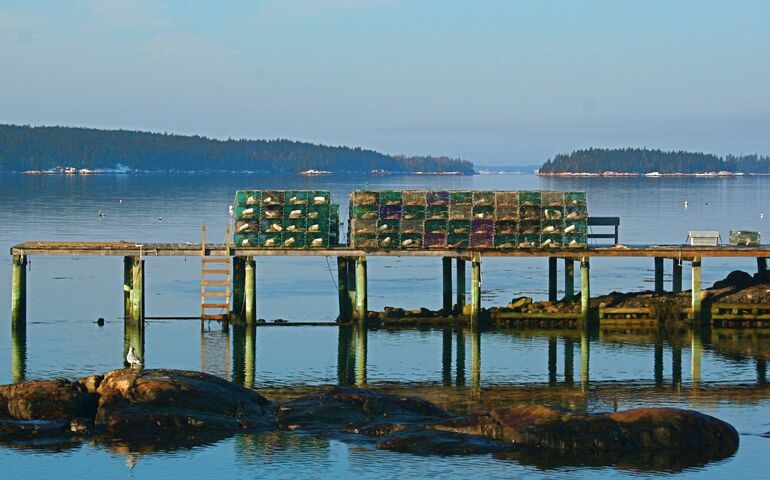Maine’s largest lobster industry group withdraws from whale agreement
 Photo / Laurie Schreiber
The Maine Lobstermen’s Association last week asked for a reassessment of the risk of Maine’s lobster fishery to the North Atlantic right whale.
Photo / Laurie Schreiber
The Maine Lobstermen’s Association last week asked for a reassessment of the risk of Maine’s lobster fishery to the North Atlantic right whale.
The Maine Lobstermen’s Association withdrew support from an agreement that calls for Northeast lobstermen to reduce their risk to endangered North Atlantic right whales by 60%.
In a letter to Chris Oliver, head of the National Marine Fisheries Service, the association said it would withdraw support for the April 2019 Take Reduction Team agreement due to “serious flaws in the data,” according to a news release.
The risk reduction strategy included removing half the number of lobster trap endlines in the water and using weak rope in the top of remaining endlines, which are the vertical lines that connect lobster traps on the ocean bottom with a buoy at the sea surface.
The targets were established by the Atlantic Large Whale Take Reduction Team, a federally convened body of approximately 60 fishermen, scientists, conservationists, and state and federal officials. The team advises the National Marine Fisheries Service, which is the federal agency that would enact any regulations.
But the Maine Lobstermen’s Association said a new analysis raises doubt on the effectiveness of a right whale protection agreement established by the team when it met in April.
“Following the TRT meeting, MLA undertook a careful review of data available from NMFS, due to unresolved concerns with the timeliness and accuracy of information provided to TRT members,” Patrice McCarron, MLA executive director, said in the release. “NMFS own data show that that the lobster fishery is the least significant cause of right whale serious injury or mortality, while ship strikes, gillnets and the Canadian snow crab fishery pose much greater risks.”
Canada gear
The MLA’s analysis revealed the Canadian snow crab fishery accounts for 31% of right whale serious injury and mortality, gillnet and netting gear represent 13%, unknown trap/pot gear represents 4% and U.S. trap/pot gear represents 4%. U.S. and Canadian vessel strikes account for the remaining 48%.
“The MLA cannot responsibly recommend its members undertake changes in fishing practices when whales may continue to become entangled in fishing gear, such as gillnets, which are not included in the current rulemaking,” McCarron continued.
The MLA review of the data also found that current whale protection measures have been effective. Changes to the right whale plan in 2009 and 2014 resulted in a strong decrease in the incidence of entanglement cases involving U.S. lobster gear, from seven cases prior to 2010 to only one case since then — a non-serious injury involving Massachusetts lobster gear. The data show only one confirmed right whale entanglement in Maine lobster gear, in 2002, with no known serious injuries or mortalities attributable to that gear. NMFS’ data also show that ropes removed from right whales in recent years are not representative of ropes used in Maine’s lobster fishery.
In addition, the MLA’s analysis showed that NMFS’ target, to reduce risk to right whales by 60%, is unsupported by the best available data. According to the release, NMFS incorrectly allocated the full responsibility for U.S. risk reduction to the Northeast lobster fishery and under-represented the role of Canadian fisheries in its calculations due to NMFS’ failure to investigate trends in right whale entanglement in unknown gear.
“As a result, the data presented to the TRT and fishing industry erroneously overstated the share of risk attributable to the Northeast lobster fishery and downplayed the role of other gears in right whale serious injury and mortality,” the release said.
McCarron added, “Maine stands ready to identify measures that address the risk posed by our fishery. In order to do this, NMFS must re-examine the 60% risk reduction target to allocate the U.S. risk to all fisheries involved and not focus only on lobster. The rules proposed are misaligned and too narrow in scope to effectively protect right whales.”
With the fight over regulatory protections heating up, at least one organization is seeking a legal remedy.
An environmental group, Whale Safe USA, said Monday it will file a federal lawsuit in Bangor seeking to get regulators in Maine and the U.S. to outlaw the use of endlines by 2020. In a news release, it said it would also begin a boycott of the commercial lobster fishing industry.










0 Comments